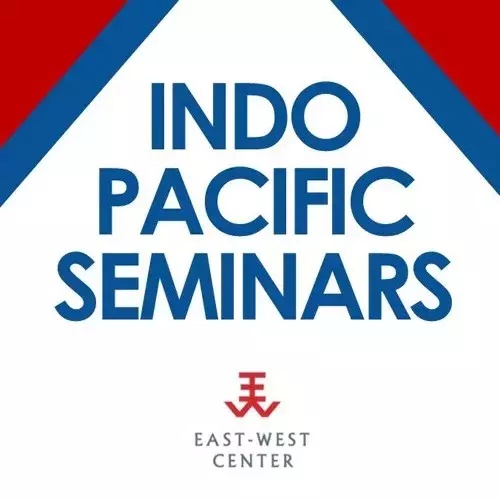Error message

OFFICE/DEPARTMENT
The East-West Center in Washington invites you to an
Indo-Pacific Political Economy and Trade Virtual Seminar:
Strengthening US-Japan-Southeast Asia Cooperation on Japan`s Connectivity Initiatives in the Indo-Pacific
Featuring:
Mr. Kensuke Yanagida
Visiting Fellow,
U.S.-Japan-Southeast Asia Partnership in a Dynamic Asia Fellowship
East-West Center in Washington
Dr. Satu P. Limaye (Moderator)
Vice President, East-West Center &
Director, East-West Center in Washington
Indo-Pacific concepts have been widely shared by countries and economies across the Indo-Pacific region including the US, Japan, Australia, India, ASEAN, and others. Japan`s Free and Open Indo-Pacific vision (FOIP) has evolved

from a value-based diplomatic policy and quadrilateral security cooperation, known as the Quad, responding to the rapid rise of China and its Belt and Road Initiatives (BRI), towards a comprehensive regional cooperation policy. As is well known, Japan has played an important role in East Asian economic development through providing Official Development Aid (ODA), resulting in attracting private investments and developing supply chains. One pillar of the FOIP is to continue this effort in the Indo-Pacific region by improving regional connectivity with quality infrastructure. Mr. Yanagida discussed the likely economic impacts of the FOIP connectivity initiatives and how the US, Japan, and Southeast Asia should strengthen cooperation within these initiatives.
Speaker Biographies
Kensuke Yanagida is a Research Fellow at the Japan Institute of International Affairs. He was earlier a Research Fellow at GRIPS Alliance, National Graduate Institute of Policy Studies in Tokyo, Japan; a Visiting Associate Professor at the Faculty of Law, Kyushu University; and a Research Associate at the Asian Development Bank Institute. He has a Master’s degree in Public Policy from the Lee Kuan Yew School of Public Policy, National University of Singapore. His research interests include international trade issues in Asia. His publications include “The Effects of Mega-Regional Trade Agreements on Vietnam” with Tomoo Kikuchi and Huong Vo in Journal of Asian Economics.
Satu Limaye is Vice President of the East-West Center and the Director of the East-West Center in Washington where he created and now directs the Asia Matters for America initiative and is the founding editor of the Asia Pacific Bulletin. He is also a Senior Advisor at CNA Corp (Center for Naval Analyses) and Senior Fellow on Asia History and Policy at the Foreign Policy Institute at Paul H. Nitze School of International Studies (SAIS). He is a magna cum laude and Phi Beta Kappa graduate of Georgetown University and received his doctorate from Oxford University (Magdalen College) where he was a George C. Marshall Scholar. Recent publications include: “America’s ‘Pacific Principle’ in an Indivisible Pacific Islands Region,” (Asia-Pacific Bulletin); “Despite Stumbles, America’s Engagement with Southeast Runs Deep,” (Global Asia); Raging Waters: China, India, Bangladesh, and Brahmaputra Water Politics (Marine Corps University Press); Russia’s Peripheral Relevance to US-Indo Pacific Relations (Center for the National Interest).
The East-West Center in Washington invites you to an
Indo-Pacific Political Economy and Trade Virtual Seminar:
Strengthening US-Japan-Southeast Asia Cooperation on Japan`s Connectivity Initiatives in the Indo-Pacific
Featuring:
Mr. Kensuke Yanagida
Visiting Fellow,
U.S.-Japan-Southeast Asia Partnership in a Dynamic Asia Fellowship
East-West Center in Washington
Dr. Satu P. Limaye (Moderator)
Vice President, East-West Center &
Director, East-West Center in Washington
Indo-Pacific concepts have been widely shared by countries and economies across the Indo-Pacific region including the US, Japan, Australia, India, ASEAN, and others. Japan`s Free and Open Indo-Pacific vision (FOIP) has evolved

from a value-based diplomatic policy and quadrilateral security cooperation, known as the Quad, responding to the rapid rise of China and its Belt and Road Initiatives (BRI), towards a comprehensive regional cooperation policy. As is well known, Japan has played an important role in East Asian economic development through providing Official Development Aid (ODA), resulting in attracting private investments and developing supply chains. One pillar of the FOIP is to continue this effort in the Indo-Pacific region by improving regional connectivity with quality infrastructure. Mr. Yanagida discussed the likely economic impacts of the FOIP connectivity initiatives and how the US, Japan, and Southeast Asia should strengthen cooperation within these initiatives.
Speaker Biographies
Kensuke Yanagida is a Research Fellow at the Japan Institute of International Affairs. He was earlier a Research Fellow at GRIPS Alliance, National Graduate Institute of Policy Studies in Tokyo, Japan; a Visiting Associate Professor at the Faculty of Law, Kyushu University; and a Research Associate at the Asian Development Bank Institute. He has a Master’s degree in Public Policy from the Lee Kuan Yew School of Public Policy, National University of Singapore. His research interests include international trade issues in Asia. His publications include “The Effects of Mega-Regional Trade Agreements on Vietnam” with Tomoo Kikuchi and Huong Vo in Journal of Asian Economics.
Satu Limaye is Vice President of the East-West Center and the Director of the East-West Center in Washington where he created and now directs the Asia Matters for America initiative and is the founding editor of the Asia Pacific Bulletin. He is also a Senior Advisor at CNA Corp (Center for Naval Analyses) and Senior Fellow on Asia History and Policy at the Foreign Policy Institute at Paul H. Nitze School of International Studies (SAIS). He is a magna cum laude and Phi Beta Kappa graduate of Georgetown University and received his doctorate from Oxford University (Magdalen College) where he was a George C. Marshall Scholar. Recent publications include: “America’s ‘Pacific Principle’ in an Indivisible Pacific Islands Region,” (Asia-Pacific Bulletin); “Despite Stumbles, America’s Engagement with Southeast Runs Deep,” (Global Asia); Raging Waters: China, India, Bangladesh, and Brahmaputra Water Politics (Marine Corps University Press); Russia’s Peripheral Relevance to US-Indo Pacific Relations (Center for the National Interest).








